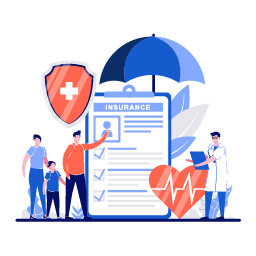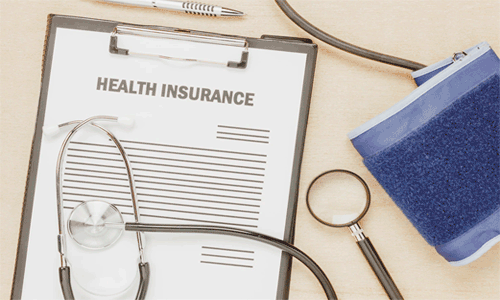Health Screening in UAE
Various health risks can go unnoticed until they become severe, making early detection crucial for effective treatment and prevention. This is where the concept of health screening plays a vital role. In the UAE, health screening is designed to identify potential health issues before symptoms ...read more
What is Health Screening?
Health screening is a medical process where individuals undergo tests and evaluations to detect potential health problems before they show any noticeable symptoms. This preventive approach plays a key role in maintaining good health by identifying risks early, enabling timely interventions, and minimising the chances of complications.
By focusing on early diagnosis, medical screening helps you take control of your health and promotes a better quality of life. It is especially important for conditions that may develop silently, such as high blood pressure, diabetes, or certain cancers.
Some of the major types of health screening in the UAE include cardiovascular screening, cancer screening, diabetes screening, genetic screening, newborn screening, sensory screening (vision and hearing), and regular health check-ups for general wellness. These tests address different aspects of health and are tailored to suit the needs of various age groups and risk categories.
Why Health Screening?
The importance of health screening is underscored by several key factors —
- Early Detection of Chronic Diseases: Regular checkups facilitate the early identification of prevalent conditions such as diabetes, hypertension, and certain cancers. Early detection, in turn, provides timely intervention, which can significantly improve treatment outcomes and reduce the risk of complications.
- Reduction of Healthcare Costs: Preventive screenings can lead to early diagnosis, allowing for less intensive and more cost-effective treatments. This approach alleviates financial burdens on both individuals and the healthcare system by minimising the need for extensive medical interventions.
- Promotion of Healthy Lifestyles: Regular screenings increase the awareness of personal health risks, encouraging individuals to adopt healthier behaviors. This mindset contributes to the prevention of diseases and fosters a culture of health consciousness within the community.
- Support for Public Health Initiatives: Medical screenings provide valuable data that inform public health strategies and policies. By understanding the health status of the population, authorities can implement targeted interventions to address specific health challenges, thereby enhancing the overall effectiveness of healthcare services.
- Alignment with National Health Goals: The UAE government emphasises preventive healthcare as a cornerstone of its health strategy. Regular screenings are integral to achieving national objectives such as reducing the prevalence of non-communicable diseases and promoting the well-being of all residents.

Types of Health Screenings Available in the UAE
In the UAE, a variety of health screening programs are available to promote early detection and prevention of diseases. These programs are tailored to address the specific health needs of different population groups across various emirates —
Periodic Comprehensive Screening (IFHAS)
Launched in January 2021 as a pilot phase, the IFHAS program was enhanced to version 2.0 in June 2023. It aims to reduce the impact of chronic diseases such as diabetes, hypertension, heart disease, certain cancers, and dental problems through proactive prevention and early detection.
The program targets adult Thiqa cardholders aged 18 to 75 in the Emirate of Abu Dhabi. In addition, it offers health screenings, usually every 3 years or more frequently if necessary. Tailored health packages are provided according to age and gender, facilitating early management of identified conditions and promoting healthier lifestyles.
National Prediabetes and Diabetes Screening Campaign
In October 2023, the Ministry of Health and Prevention (MoHAP) launched the first nationwide campaign focusing on prediabetes and diabetes screening. This initiative, aligning with the national goal of reducing diabetes prevalence, is conducted across various centres in the UAE.
The campaign aims to collect data to assess the effectiveness of early detection and immediate lifestyle interventions in mitigating risk factors and decreasing the incidence of diabetes, supporting the UAE Centennial 2071 objectives.
Premarital Screening
The UAE mandates premarital health screenings to identify infectious diseases and genetic disorders, ensuring the well-being of couples preparing for marriage. These screenings test for conditions such as hepatitis B, HIV, syphilis, and genetic disorders like thalassemia.
Implemented nationwide, the program promotes informed health choices among couples. Its aim is to prevent potential health complications in future offspring and uphold public health standards.
Newborn Screening
The UAE newborn screening program focuses on the early detection of genetic, metabolic, and endocrine disorders in infants. By conducting these screenings shortly after birth, healthcare providers can initiate timely interventions, prevent severe health complications, and promote healthy development.
This program is implemented across all emirates.
Cancer Screening Programs
Various emirates have established cancer screening initiatives targeting common cancers such as breast, cervical, and colorectal cancer.
For instance, the Dubai Health Authority (DHA) offers screening services to facilitate early detection and improve treatment outcomes. These programs are designed to identify cancers at an early stage, thereby enhancing the chances of successful treatment and reducing mortality rates.
Occupational Health Screening
Occupational health screenings are mandatory for individuals working in certain industries such as construction, healthcare, food services, and more. These tests evaluate a worker's physical and mental ability to perform specific tasks while ensuring they don’t pose a health risk to others.
Occupational screening includes tests for infectious diseases, hearing and vision assessments, and fitness evaluations. Introduced across the emirates, these screenings aim to maintain workplace safety and compliance with public health regulations.
In Dubai, for example, the Dubai Health Authority (DHA) conducts medical fitness screenings for residency and work visas. The tests include chest X-rays and screenings for communicable diseases like tuberculosis and hepatitis.
Travel-Related Health Screening
These screenings are tailored for individuals traveling to or from the UAE to ensure they meet the health requirements of their destination or comply with entry protocols. Common tests include vaccinations, tuberculosis screenings, and assessments for travel-related infectious diseases such as malaria and yellow fever.
Travel health screenings became especially prominent during the COVID-19 pandemic, with specific tests and vaccination requirements implemented for international travelers. These screenings are conducted at airports and specialised health centres throughout the UAE.
Maternal and Prenatal Health Screenings
Pregnant women in the UAE undergo comprehensive prenatal health screenings to monitor their health and the well-being of the fetus. These tests include ultrasounds, blood sugar tests, genetic screenings for chromosomal abnormalities and screenings for infections like rubella and toxoplasmosis.
Offered in government and private hospitals across all emirates, these screenings are important for safe pregnancies and reducing the risk of complications.
School Health Screenings
Mandatory health checks are conducted for schoolchildren to monitor their growth and development. These screenings include dental examinations, vision and hearing tests, and assessments for conditions like obesity or scoliosis.
Implemented across the UAE, these screenings help identify potential health issues early.
Blood Donation and Screening Programs
Blood donation centres in the UAE conduct thorough screenings to provide the safety of both donors and recipients. They test for infectious diseases such as HIV, hepatitis B and C, and syphilis.
The Emirates Blood Bank, operating under the Ministry of Health and Prevention, leads efforts to ensure a safe and sufficient blood supply for medical emergencies.
Who Conducts Health Screening in UAE?
Here is a table highlighting the government entities responsible for conducting health screenings in the UAE —
|
Government Entity |
Role in Health Screening |
Location |
|---|---|---|
|
Ministry of Health and Prevention (MoHAP) |
Oversees public health initiatives, including nationwide health screenings for chronic diseases and newborn health |
Nationwide |
|
Dubai Health Authority (DHA) |
Conducts medical fitness tests for residency, premarital screenings, and preventive health check-ups |
Dubai |
|
Abu Dhabi Department of Health (DoH) |
Implements programs like the IFHAS periodic health screening and other public health campaigns |
Abu Dhabi |
|
Sharjah Health Authority (SHA) |
Focuses on community health programs, including screenings for chronic conditions |
Sharjah |
|
Ras Al Khaimah Health Department |
Provides general health screening services and promotes preventive healthcare |
Ras Al Khaimah |
|
Fujairah Medical District |
Conducts screenings for communicable diseases and offers prenatal and newborn health services |
Fujairah |
|
Ajman Medical District |
Supports public health through regular screenings and health awareness programs |
Ajman |
|
Umm Al Quwain Medical District |
Offers screenings for chronic diseases and prenatal care |
Umm Al Quwain |
How to Prepare For Your Health Screening Appointment?
By preparing for your health screening appointment, you can experience a smooth process and get accurate results. Here are some essential steps to follow —
- Fasting Requirements: For tests like blood glucose and cholesterol levels, fasting for 8 to 10 hours before the appointment is often necessary. During this period, consume only water and avoid any food or beverages. Confirm specific fasting instructions with your healthcare provider.
- Medication Guidelines: Continue taking prescribed medications unless advised otherwise. Inform the medical staff about all medications and supplements you're using, as some may influence test outcomes.
- Required Documentation: Bring valid identification (like Emirates ID or passport), insurance details, and any referral letters. For specific screenings such as visa medicals, additional documents like appointment confirmations or employer letters may be needed.
- Appropriate Attire: Wear comfortable clothing that allows easy access to areas like the upper arm for blood pressure measurements or blood draws. Depending on the screening, you might be asked to change into a medical gown.
- Hydration: Drink sufficient water before your appointment to facilitate blood sample collection and overall comfort during the screening.
- Arrival Time: Aim to arrive at least 20 minutes before your scheduled time to complete any necessary paperwork and to settle in without rush.
- Health Information: Be ready to discuss your medical history, including past illnesses, surgeries, and family health history — this information is crucial for accurate assessment.
- Specific Instructions: Some screenings may have unique requirements such as avoiding certain foods or activities beforehand. Always follow the specific guidelines provided by your healthcare provider or the screening centre.

Health Screening Costs in the UAE
Health screening costs vary based on the type of screening, healthcare provider, and emirate. Government health authorities offer certain screenings at subsidised rates or free of charge, while private healthcare facilities set their own pricing structures.
Here is an overview of health screening costs across different emirates —
|
Emirate |
Health Authority |
Screening Program |
Cost |
Notes |
|---|---|---|---|---|
|
Abu Dhabi |
Department of Health (DoH) |
Periodic Comprehensive Screening (IFHAS) |
Covered for Thiqa cardholders |
Thiqa cardholders aged 18-75 are required to undergo IFHAS to maintain full insurance benefits |
|
Dubai |
Dubai Health Authority (DHA) |
Medical Fitness Test for Residency Visa |
AED 320 - AED 700 |
Cost varies based on service type (e.g., standard, urgent) |
|
Nationwide |
Ministry of Health and Prevention (MoHAP) |
National Prediabetes and Diabetes Screening Campaign |
Free |
Offered at various medical centers and workplaces |
Additional Notes
- Private Healthcare Facilities: Prices for health screenings in private hospitals and clinics vary widely. It's advisable to contact individual facilities for specific pricing information.
- Insurance Coverage: Some health screenings may be covered under certain insurance plans. Consult with your insurer to understand your benefits.
- Promotional Packages: Healthcare providers occasionally offer discounted health screening packages during health awareness campaigns or special occasions.
Disclaimer: For the most accurate and up-to-date information, it's recommended to directly contact the relevant health authority or healthcare provider.
Technology in Health Screenings: The Role of AI and Advanced Diagnostics
In 2024, the UAE continues to make significant strides in incorporating cutting-edge technology, including Artificial Intelligence (AI) and advanced diagnostics, into its health screening programs. These innovations are transforming the healthcare system by improving the accuracy, efficiency, and reach of screenings.
AI-Powered Diagnostics
- AI-Assisted Imaging: AI is extensively used to analyse medical images such as chest X-rays, mammograms, and colonoscopy visuals. This technology improves the early detection of conditions like cancer, tuberculosis, and cardiovascular diseases by identifying abnormalities that might be missed by the human eye.
- Automated Screening Tools: AI-driven platforms ensure faster processing of diagnostic tests. This not only reduces the workload of healthcare professionals but also increases the number of patients who can be screened daily.
Advanced Diagnostic Tools
- Portable Screening Devices: Advanced portable diagnostic tools equipped with AI are now being used for on-the-spot health assessments. These devices facilitate retinal scans, skin cancer checks, and other non-invasive screenings.
- Genomic Testing: High-throughput genomic testing technologies are used for the early identification of hereditary disorders and predispositions to diseases. These tests are particularly beneficial in newborn and premarital screenings.
- Predictive Analytics: AI-powered predictive models analyse patient data to forecast potential health risks.
Benefits of Technology in Health Screenings
- Enhanced Accuracy: AI algorithms improve the precision of health screenings and reduce both false positives and negatives.
- Increased Accessibility: Portable diagnostic tools and automated systems expand access to health screenings, even in remote areas.
- Improved Efficiency: Automation in diagnostics accelerates the screening process, allowing healthcare providers to cater to a larger population.
Frequently Asked Questions (FAQs)
Q: Who is required to undergo health screening in the UAE?
Health screening is mandatory for certain groups, such as individuals applying for residency visas, employees in specific sectors like food services or healthcare, couples planning to get married, and more. Additionally, health screenings are recommended for all residents as part of preventive healthcare, especially for those above 18 or with a family history of chronic diseases.
Q: Are health screenings for residency visas different from general health screenings?
Yes, residency visa health screenings focus on detecting communicable diseases like tuberculosis, HIV, and hepatitis. These screenings confirm public health safety and are a requirement for visa approval. General health screenings, on the other hand, assess overall health and may include tests for chronic diseases, cancers, lifestyle-related conditions, and more.
Q: How often should I get a health screening in the UAE?
The frequency of health screenings depends on factors like age, gender, medical history, and specific health risks. For instance —
- Adults over 18 are advised to undergo periodic screenings every 1-3 years
- Women should consider regular screenings for breast and cervical cancer
- Those with a family history of chronic diseases may need more frequent tests
It’s best to consult your healthcare provider to determine the appropriate schedule.
Q: Can expatriates access government health screening services?
Yes, expatriates in the UAE can access government health screening services for specific purposes, such as residency visa applications and mandatory premarital screenings. Some preventive health screenings may also be available at government facilities, although expatriates might need to pay a fee unless covered by insurance.
Private clinics and hospitals also offer a wide range of health screening options for expats.
Health Insurance Popular Searches
Health Insurance UAE | Dubai Health Insurance Cost | Health Insurance for Kids | Health Insurance Plans for Family | Dental Insurance | Individual Health Insurance | Health Insurance Abu Dhabi | Medical Insurance Sharjah | How to check Medical Insurance status with Emirates ID | Best Medical Insurance in UAE | Health Insurance for Parents | Maternity Insurance UAE
More From Health Insurance
- Recent Articles
- Popular Articles









.png)















